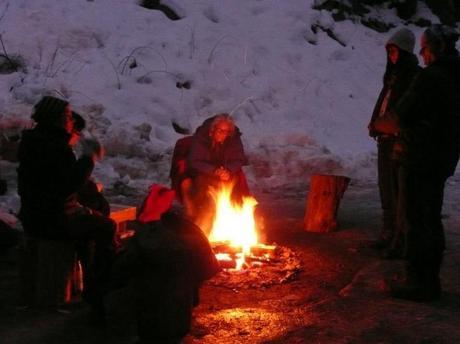by Hannibal Rhoades / Intercontinental Cry

Photo: Sinixt Nation Facebook page
For the past week, members of the Sinixt Nation have maintained a peaceful encampment on Mt Sentinel logging road at Pass Creek, British Columbia. Despite being declared officially extinct by the Canadian government in 1956, their very real presence is blocking the A.F. Timber Company from ‘harvesting’ 15,250 square meters of timber on unceded Sinixt territory without proper consultation.
According to Dennis Zarelli, Sinixt communications liason, discussions between the Sinixt and contractors have been “pretty diplomatic” since the camp was established.
The Sinixt Nation’s primary quarrel is not with A.F. Timber Co. or their employer, Porcupine Wood Products of Salmo, but with BC Timber Sales, who awarded these companies the license to build 1.8km of roads and cut timber without consulting the Sinixt.
Bill Kestell, Porcupine Wood Products’ woodland manager, said no logging had taken place before the cultural encampment appeared, and conveyed both his company’s frustration and the determination of the Sinixt People:
“They admit their fight is not with us, but we’re the ones who can’t go to work. The local contractor (A.F. Timber Co.) depends on logging to earn a living, but there’s nothing they can do. The people seem pretty intent on staying there.”
“We realize this is causing hardships, but we’re not responsible for that” says Zarelli. “The government is responsible for making sure First Nations consultations have been addressed.”
In the case of Pass Creek, the Ministry of Forests reports that BC Timber Sales failed to engage with the Sinixt despite consulting a number of other First Nation groups with territorial claims in the area. However, the company does not have the same legal obligation to consult the Sinixt as they remain unrecognized by provincial and federal government agencies, having been declared officially ‘extinct’ by Canada in 1956 under the Indian Act.
The Ministry subsequently commented that the Sinixt had the opportunity to input on the licensing process like other members of the public, belying the Sinixt’s millennial connection to their lands while failing to address the root cause of the Sinixt’s logging blockade–namely, their three decade-long struggle for the correction of their ‘extinction’ status, the recognition of the Sinixt First Nation, and the extension of their rights.
Pass Creek represents only the latest standoff in the Sinixt’s quest for recognition. BC Timber Sales also failed to consult them over a logging license given to Sunshine Logging of Kaslo at Slhu7kin or Perry Ridge, a biodiverse cultural wetland. The Sinixt maintain a cultural encampment there despite receiving a Notice of Trespass on Crown Land, and losing a 2011 court case to prevent the logging.
Both Pass Creek and Perry Ridge are sites of archaeological importance, demonstrating the Sinixt’s historic presence in their territory. Straddling the US-Canada border and stretching from the peaks of the Rocky Mountains to the Arrow Lakes, Slocan Valley and Columbia River, the Sinixt contend that their traditional territory encompasses all Interior Salish lands.
Zarelli describes the area currently under Sinixt protection at Pass Creek as “archaeologically sensitive” with many “undocumented sites beneficial to everybody”.
Due in part to the Sinixt’s work in recognizing these archaeological sites, and also in protecting them, they have won recognition from some crown authorities in recent years, including BC Parks, BC Hydro and Fortis BC. However, stand-offs and protests such as that at Pass Creek are likely to continue as long as the Sinixt’s extinction status remains, and their connection to their land goes unrecognized.
“It’s a deep issue for everyone and we’ll see if truth prevails or ignorance continues,” says Zarelli.
The Sinixt say they will remain at their camp at Mt Sentinel until their right to consultation, land and culture is respected as a First Nation; one that has never relinquished it’s land rights to any organization or government.

